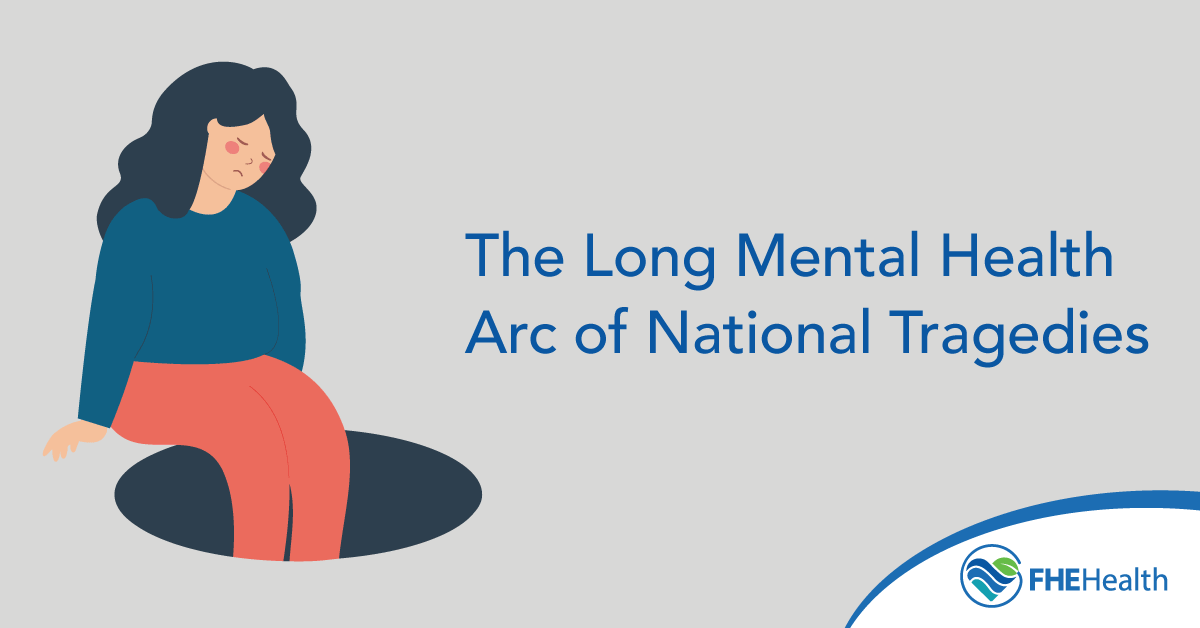
Post-traumatic stress disorder (PTSD) develops after someone witnesses or experiences a traumatic event. For example, a veteran who served in a combat zone may experience flashbacks due to their military experience. PTSD also develops after mass disasters, which are situations involving a critical number of victims. In the wake of the September 11 terrorist attacks, many people developed 9/11 PTSD, a mental health condition characterized by disturbing memories or thoughts of the attacks and their victims.
Mass disasters are always a possibility, so it’s important to understand the short-term and long-term effects. Once you understand the symptoms, you can get the help you need to recover.
Immediate Psychological Impact of National Tragedies
In the immediate aftermath of a national tragedy, it’s common to experience grief, fear, sadness, and panic. On September 11, many people worried that more attacks would be forthcoming. The attacks also took out telecommunications capabilities in Lower Manhattan, causing some people to panic when they couldn’t get in touch with family members who were supposed to be in the vicinity that day.
The United States isn’t the only country to suffer through the aftermath of a national tragedy. In 2015, citizens of France were left reeling after several attacks in a row. Two terrorists attacked the Charlie Hebdo offices in Paris, leaving 12 people dead. During the same week, four people were murdered in a Jewish supermarket.
The attackers targeted people based on their political and religious beliefs, leaving citizens worried about whether they would be next. Members of the Muslim community also had to worry about being attacked in retaliation for the murders. Religious schools in France and Belgium had to cancel classes due to heightened tensions, leaving children and their parents worried about their futures.
Immediate Mourning
In the aftermath of 9/11, people started mourning almost immediately. They lit candles, placed flowers near the site of the World Trade Center attacks, and sobbed as they watched 24-7 news coverage. Some traveled to the World Trade Center site to hang up missing posters featuring their loved ones’ photos and descriptions.
People from all over the world sent cards, journals, paper flowers, and other items to honor the victims and show sympathy for Americans who lost their loved ones and their sense of safety. For example, several cities and villages in Africa pooled their resources to have condolence books delivered to the United States.
Americans have also mourned the victims of national tragedies in other countries, demonstrating that grief and loss are universal experiences. After the Charlie Hebdo attacks, Saturday Night Live did away with its usual cold opening to have Cecily Strong pay tribute to the victims. In flawless French, Strong offered love and support to Parisians struggling with strong emotions.
Short-Term Mental Health Responses
Knowing that the psychological effects of 9/11 would have a major impact on victims and their family members, government agencies and private mental health organizations took immediate action. First responders participated in debriefing sessions, giving them a chance to express their grief after fighting raging fires, encountering deceased victims, and helping critically injured individuals.
Some organizations offered “psychological first aid” to first responders. One of the main goals of psychological first aid is to give participants a sense of safety. Psychological first aid also emphasizes the importance of social connectedness. Not every first responder had a spouse or another family member to talk with once they got home, making it extremely important for them to discuss their experiences with each other and decompress after a long day of working in dangerous conditions.
Long-Term Mental Health Effects
A national tragedy isn’t just something you “get over” in a matter of weeks or months. It leaves a lasting impact on victims’ family members, first responders, and witnesses. The September 11 attacks are no exception. According to the City of New York 9/11 Health website, people experiencing a 9/11-related loss were twice as likely to be diagnosed with PTSD, depression, or another mental health condition.
Individuals suffering from 9/11-related losses were also more likely to experience work loss and other functional impairments. People with PTSD from 9/11 may have trouble engaging in social interactions, working in large groups of people, or performing other activities required to maintain employment, making it difficult to keep a job. Even if an individual with 9/11 PTSD keeps their job, they may be absent more than someone who doesn’t have PTSD or another mental health condition.
Community and Societal Healing Processes
In the months and years following the 9/11 attacks, community members came together to honor the victims and work to prevent similar attacks from happening again. Thousands of people attended vigils in New York City, Shanksville, and Washington, D.C. On the September 11 National Day of Service and Remembrance, people participate in volunteer projects designed to make the world a better place. This day of remembrance honors victims and first responders, ensuring they’re never forgotten.
Strategies for Individual and Collective Recovery
Psychological first aid has proven effective in helping individuals and groups recover from the effects of a national tragedy. In addition to establishing a sense of safety, psychological first aid promotes efficacy, calmness, and connectedness. This type of intervention also fosters hope without minimizing the serious impact of a national tragedy on victims and observers.
Efficacy refers to an individual’s ability to care for themselves and their family members. To promote calmness, mental health professionals teach participants how to relax and relieve stress. For example, people receiving psychological first aid may learn how to meditate or use self-care measures to reduce their stress levels. Mental health professionals also help participants achieve connectedness by helping them take advantage of available social support.
If you’ve been struggling with 9/11 PTSD or another mental health condition, you don’t have to suffer in silence. FHE Health has compassionate treatment professionals available to help you improve your coping skills and manage your symptoms. Contact us today to begin your recovery.







